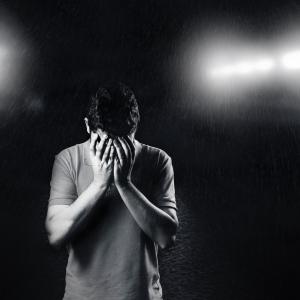Men's Idea Of Masculinity Prevent Many From Seeking Anxiety Treatment
It would be easier to be a man with anxiety if it weren't for that doggone thing called masculinity. Whether it is free-floating anxiety, a phobia, social anxiety, panic disorder, obsessive-compulsive disorder (OCD) or a symptom of post-traumatic stress disorder (PTSD), no one wants to appear weak, even in front of mental health professionals.
Maybe someday we will develop a mindset where getting help for a problem is considered a sign of strength, not weakness. To help create this strength mindset, we can look at some mistakes in thinking that keep men (and some women) from seeking help.
Four Masculine Behaviors that Cannot Relieve Anxiety
Generally speaking, men do not reach out for comfort or help when upset or distressed. They tend to hunker down in their version of a man-cave to be with their own thoughts. This seems like a plausible solution except that no known human being has successfully thought their way out of a problem with anxiety.
Whether we are male or female, the masculinity within us likes to fight against anxiety or to stand-tough and outlast it. Unfortunately, what we fight against within ourselves we make stronger. Even if we outlast one round of anxiety, unless the underlying issues are resolved, we will have more rounds to face.
Being strong, virile and “manly” is a matter of pride for most men. Many fall short of their masculine ideal even without having issues with anxiety. Seeking help for a “mental-emotional” problem might be unthinkable to someone already riddling themselves with negative anxiety self-talk.
Women surely develop their share of bad habits, but men have more of a knack for developing nasty coping behaviors. They might distract themselves from thoughts and feelings by gambling, drinking, using substances or engaging in reckless behaviors. Then, adding to their anxiety, they create dependency and addiction issues.
How to Feel OK About Getting Help
Know that many problems men and women have in life are not the result of an inherent weakness, but the result of not having learned effective skills. Many individuals resolve some, if not all, of their mental and emotional problems by learning effective relationship and communication skills and by learning how to express their emotions to get what they need and want.
The fact that so many of us reach adulthood not equipped with excellent life skills is part of the human condition, not a result of an imagined weakness. We survive with our wobbly, ineffective skills for years because we are incredibly strong creatures, but the toll this takes is paid out in stress, anxiety, and depression.
If your anxiety is owed to a traumatic experience, remember that going through trauma without being affected would indicate weakness. Being affected by a traumatic experience is normal, even if the symptoms that result are considered part of a disorder. Ask for help because you are a sensitive, feeling being who was strong enough to get through an experience that would naturally disturb a sensitive, feeling being.
Source of Four Ineffective Behaviors: Calm Clinic
Photo: Pexels







